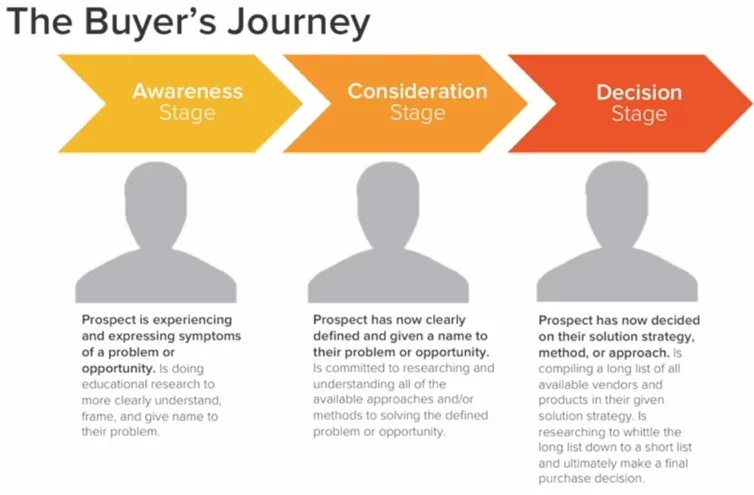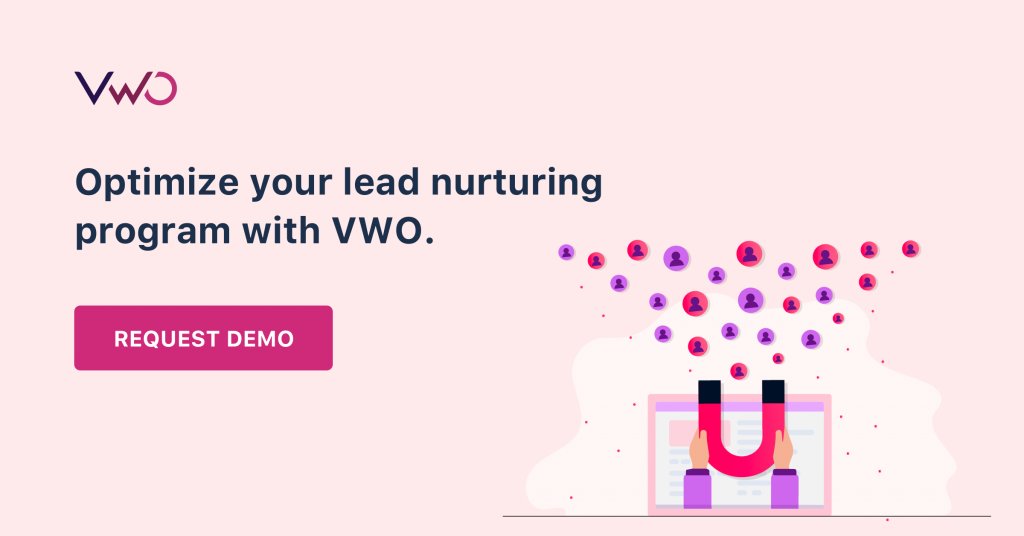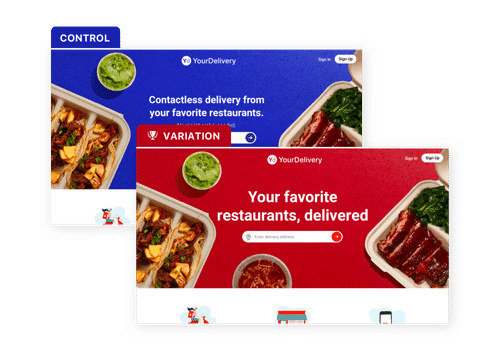B2B Lead Nurturing: Learn How to Close More Deals
As a marketer, you are supposed to feed the top of the sales funnel of your company with leads.
But do you think those leads would push themselves down the entire sales process or funnel on their own? Well, that rarely happens. You need an effective lead nurturing program for your business in order to procure quality leads that convert into sales.
Before we jump into strategizing lead nurturing for your business, the first and foremost step is to get your B2B marketing teams and sales teams aligned, which forms the backbone of a strong nurturing system.
Download Free: A/B Testing Guide
What is lead nurturing?
Lead nurturing is the process of listening to the needs of your prospects at every stage of your sales cycle and communicating solutions to them for building trust and maintaining a connection. Such nurturing helps them convert into paying customers.
However, you must keep reminding yourself that your prospects are smart and tech-savvy individuals, who are exploring solutions to their pain points everywhere online. It is an opportunity for you to listen to their needs and serve them along their buying journey by being available across different channels.

What is lead qualification?
Lead qualification is the process of determining whether a prospect fits your ideal customer profile. It has a high chance of becoming a customer and, most importantly, has a high probability of being a successful long-term customer.

What is lead scoring?
Lead scoring is assigning a point value to your leads, based on the information they have provided. Typically, it is a score that compiles behavioral as well as demographic data that qualifies it as a significant lead.
For instance, a non-business email ID could be one of the demographic data points where you could assign a score lower than those who have signed up with their professional business IDs. Similarly, communication over a call or an email could also become a behavioral data point to assign a score, basis the nature of your business.
Learn more about lead scoring in this video:
What are lead nurturing campaigns?
Lead Nurturing campaigns are the baseline elements to strategize the sales funnel content for your prospects, ensuring sales and conversion.
Through A/B testing lead nurturing campaigns, marketers can understand different personas in order to engage with the prospects personally and also the effectiveness of their campaigns, and thus increase their business conversions.
Types of lead nurturing campaigns
- Educational: This type of campaigns are best for non-sales ready prospects as the content aims to only educate and inform them.
- Product/Service: These campaigns focus on the typical aspects of the products or services in which the prospect has explicitly shown interest to gain more knowledge.
- Promotional: Promotional campaigns facilitate the push you want your leads to get to reach the bottom of the sales funnel, such as discounts, special pricing.
- Event engagement: This type of campaign focuses on the engagement around pre and post registration done by your prospects. These may include webinars as well as in-person events.
- Re-engagement: These campaigns are similar to the wake-up calls to the leads that go silent during the sales cycle. Email marketing is a powerful marketing practice to re-engage your dormant prospects.
- Authority perception campaigns: Prospects need a final assurance before investing their money in your product or service. Authority perceptions emails should include the press releases, high-ranking industry reports around your business, and links to your high-traffic content pieces to ensure that your prospects are making the right decision.
- Welcome campaign: The real purpose of sending welcome emails is to move new customers through your onboarding process. Make sure your welcome emails are informative, clear, and actionable. A/B test your content to zero-in what brings you conversions.
Core elements of B2B lead nurturing campaign
Here are some core elements that you must consider while ideating your B2B lead nurturing campaign.
1. Understand buyer personas
What do they want to accomplish at work?
That is a question you should ask your imaginary ideal prospects, which contribute to your buyer persona based on the current customer base that you have.
2. Personalize
Personalization is an integral part of a successful lead nurturing strategy. Writing personalized informal emails, addressing your prospects by name, and communicating in a conversational tone make them feel more connected to you.
3. Educate your prospects
One of the most critical steps in closing the sales cycle is to educate your prospects on the current state of their buyer journey, which can be categorized into the following phases:
- Awareness phase: Do include blog posts related to your leads, and their interests. Educate your prospects with the latest trends in their industry.
- Consideration phase: Do invite your leads to events such as webinars about your product, or a demo.
- Decision phase: As a final step, do share success stories of your customers, testimonials, and product reviews.

Image source: Hubspot
If you are unsure what content you should be sending out to your prospects, understand what resources they have already engaged with. Draft relevant content and A/B test to find the most engaging content for your campaign. You must know the pages on your website with which they are interacting the most and the kind of social media posts that they usually share.
Chase their pain points that you can provide a solution to. Formulate a hypothesis on the basis of your previous prospects and test it.
4. Retargeting
Push notification is a powerful tool when it comes to engagement and also re-engagement. By asking your customers about their feedback, giving them an incentive, and creating a sense of urgency, you can win your customer. Besides, you can also re-engage the prospects by using dynamic calls-to-actions on your website.
Here is a real-life example of Ubisoft, which is a leading creator, publisher, and distributor of interactive entertainment and services in gaming. VWO Engage enabled Ubisoft to get an average click rate of 17%. This is a big deal compared to the average click rate of most emails, which is between 2 to 4%.

5. Don’t spam
Sending emails on a daily basis would not only irritate your prospects but show you as sales-hungry. As a result, they might end up unsubscribing and would never spend a dime on you.
You should keep experimenting until zeroing on an appropriate time interval for following up with your prospects, basis what works best for your business.
Segmenting and grouping your contacts by more defining traits would help you ensure you are sending out relevant information to your prospects which is more likely to earn their attention. The traits can be, for instance:
- Job Title
- Age
- Location
- Interests
As a Product Marketing Manager at HubSpot, Jeffrey Russo explains, that at HubSpot, they segment their audience on the basis of marketing persona and lifecycle stage. There are three main personas that HubSpot uses to create useful content to nurture leads:
| Persona | Position | Responsibilities | Typical Campaign Content |
| Enterprise Erin | Erin oversees the marketing efforts at a larger enterprise organization. | Erin likely manages a departmentalized marketing team with mature processes and sophisticated technology in place. Erin is often judged on lead volumes or revenue targets. | Campaign typically feature content that covers marketing thought leadership and advanced topics. |
| Marketing Mary | Mary heads marketing at a mid-sized organization. | Mary manages a small team of marketers and is often stretched for time. She is often judged on lead volume and is always looking for new ways to increase lead quantities. | Content is framed around lead generation or other marketing strategies she has expressed interest in. |
| Owner Ollie | Ollie is a small business owner who is a real ‘jack of all trades.’ | Ollie does not have a background in marketing but he needs to figure out a way to generate marketing results to keep his business alive. | Features shorter, introductory-level content designed to introduce someone who might be new to marketing to some basic yet important topics. |
HubSpot combines these personas with the prospects’ lifecycle stage, that is, where they are in the buying cycle. Here is an example of how they nurture leads for the Marketing Mary persona after they know this type of prospect is considering a purchase.
| Content Offer | Call to Action (CTA) | |
| Step 1 | Learn How to Prove the Value of Your Marketing Efforts | Sign up for a free assessment |
| Step 2 | eBook offer: Generation More Leads with Your Website | Download the eBook |
| Step 3 | Watch a Quick Video Demo of HubSpot’s Marketing Software | Watch the video |
| Step 4 | Deep Dive: Email Marketing with HubSpot | Request a demo |
6. Start now!
Do not wait for your prospect to express purchase intent to start the lead nurturing process. You can start nurturing leads as soon as they engage with you in any form, with any part of your business, even if that means engaging with your blog content.
7. Use content marketing to address the prospect’s pain points
Today, buyers are more empowered than marketers. They discard anything that smells like an ad or a promotional campaign. That is where content marketing comes in, which is about being thoughtful of your prospects’ pain points and generating content that solves those pain points.

Content marketing enables you to win your prospects’ trust, who are likely to become your potential customers, and simultaneously facilitates your establishment as a thought leader in the industry.
Download Free: A/B Testing Guide
Benefits of nurturing leads
Lead nurturing efforts are very fruitful for any B2B company. Here is a list of benefits that lead nurturing brings with it.
1. Increased conversion rate
A lead nurturing strategy takes care of the pain points and requirements of high-intent leads with a personalized journey through the sales funnel.
For example, a SaaS company publishes a case study on its product usage to solve a critical problem in the hospitality industry. The company later shares the case study with its leads at the bottom of the funnel via their sales and marketing teams.
The whole process will make the lead understand the product capability and benefits that it will bring to the table. That’s why more leads will convert to paying customers, as they find the product and service relevant with all the doubts and queries resolved before the purchase.
2. Shorter sales cycle
Over a period, lead nurturing builds trust with the lead as it involves sharing not just product-related information, but best practices in the industry, thought leadership, and ethics and values of the company. It reduces the sales cycle as a lead knows with whom they are dealing and how becoming a client will help them in running their business.
3. Better management of high-intent leads
Understanding your leads is a crucial aspect of all B2B lead nurturing strategies. It helps in segmenting leads based on factors like requirements, budget, and readiness to buy. The segmentation allows prioritizing high-intent leads, which in turn increases the likelihood of getting more paying customers.
4. Complements other marketing initiatives
Lead nurturing involves building and maintaining relationships with potential customers over time. As you engage with these leads and provide them with relevant and valuable content, you gain a deeper understanding of their needs, preferences, pain points, and behavior.
This increased knowledge about your leads presents several opportunities for marketing initiatives like cross-selling and upselling, which can have a positive impact on your company’s revenue and customer satisfaction. For example, if you offer a software solution, you may find that a lead who initially showed interest in your basic package might benefit from additional features or add-ons that complement the main product.
Lead nurturing: best practices to follow
You have an amazing lead nurturing campaign but there is something missing that is not enabling it to become a success. It could be as basic as the quality of your leads, which are not sales-ready. Here are some B2B best practices to nurture leads and nudge them down the sales funnel and close the deals.
1. Utilize lead enrichment services
Would it not be fantastic if you get every detail of your lead just by using their email address?
That is precisely what Lead Enrichment services do!
Below is a list of popular tools that are used extensively for lead enrichment:
| Services | Pricing | Search Method | Domain Support | Rating |
| Clearbit | $99/Month | Only Emails | All | 4.3/5.0 |
| BeenVerified | $26.89/Month | Email, Phone, Address, People Search | All | 2.7/5.0 |
| FullContact | $8.33/Month | Email, Phone & Name | Gmail | 4/5.0 |
| Pipl | $99/Month | Email & Address | Yahoo, Bing & Gmail | 4.1/5.0 |
2. Do behavior-based marketing automation
Sending wrong information too fast will show desperation; if you’re too late, you may lose your prospects to your competitors. That’s why it’s better to nurture your leads by using behavior-based marketing automation to communicate the right message at the right time during your prospects’ buying cycle.
Sending wrong information too fast will show desperation, and if you’re too late, you may lose your prospects to your competitors.
3. Spread the word about your campaign
- Using your lead magnet as the offer in a Paid Ad
- Offering your lead magnet to prospects on social media such as LinkedIn who match your persona and fit your ideal client profile
- Including links to your lead magnet in relevant blogs
- Creating videos for LinkedIn or YouTube that provide inherent value, but also include a call to action to access your lead magnet
- Sharing your lead magnet on your company social media accounts
It is crucial to feed the top of your funnel continually, so all the hard work you have done crafting your campaign does not go in vain.
Lead nurturing examples
Here are two real-world B2B lead nurturing examples, showcasing how these brands successfully nurture leads.
1. HubSpot
HubSpot employs a diverse range of lead generation tactics. Through content marketing, they create and publish high-quality blogs, e-books, and guides that offer valuable insights and solutions to common marketing and sales challenges.
Additionally, hosting webinars and virtual events on various topics related to marketing, sales, and customer service acts as lead magnets, drawing attendees who are interested in learning from industry experts. Also, to capture leads’ information, HubSpot offers free tools such as website graders, email signature generators, and CRM software, enticing visitors to provide their contact details for access.
In their lead nurturing efforts, HubSpot utilizes email marketing to keep leads engaged with personalized content based on their interests and interactions with the brand. Utilizing lead scoring and segmentation, they categorize leads based on their behavior and engagement level, enabling them to deliver more targeted and personalized content, which, in turn, contributes to their success as a leader in the B2B marketing and sales software industry.
2. Squarespace
In the early stages of the sales funnel, Squarespace focuses on attracting leads through targeted advertising and content marketing efforts. The marketing team creates and shares valuable content, such as blog posts and video tutorials, to showcase the benefits of their platform and attract potential customers. As leads become aware of Squarespace and its user-friendly website builder, they are enticed to explore the platform further. Also, Squarespace fosters a sense of community through community forums and partnerships with influencers and agencies, which solidifies its reputation and encourages word-of-mouth referrals.
Once leads progress into the consideration stage, Squarespace continues nurturing the relationship by offering a free trial and personalized email campaigns. The free trial allows potential customers to experience the platform’s features firsthand, while email marketing keeps them engaged with exclusive offers and updates. The efforts guide the leads toward the final stage of the sales funnel, where they become paying customers and potential brand advocates.
Tools that can help you in your lead nurturing journey
Many lead nurturing tools are available in the market. However, the following are three popular tools that help in lead nurturing.
1. Zendesk Sell
Zendesk Sell is a cloud-based CRM software that helps businesses to manage their sales pipeline. With a wide array of features, including personalized communication tailored to lead backgrounds, a centralized dashboard for lead management, and sales forecasting capabilities, this CRM tool proves invaluable to lead nurture.
2. Mailchimp
Mailchimp is a popular email marketing platform that helps businesses and individuals create, manage, and send email campaigns to subscribers. It’s a powerful lead nurturing tool with features like lead segmentation, automated email sequences triggered by specific events, and analytical reporting for campaign optimization.
3. WebEngage
WebEngage is a customer data platform and marketing automation suite that assists businesses in engaging and retaining users across various channels. Its features include sending triggered emails to leads based on specific actions, like visiting a particular webpage or downloading a white paper, and creating personalized landing pages tailored to each lead’s interests and needs.
To sum up
Lead nurturing is time-consuming, complicated, and tedious, but worth the hard work if you intend to close deals on a massive scale.
With a few tweaks to your content, lead scoring, and lead qualification, and other details, you can slowly but steadily be able to achieve your desired conversion.
Frequently asked questions
Here is one example of lead nurturing. Jim, a project manager attended a webinar by a B2B software company. Later, he received an email with a webinar recording and a survey to understand his needs better. Over the following weeks, he received personalized emails. As he interacted with the company’s content and social media, he received a targeted offer for a free trial of their software. This effort has effectively built trust and increased the likelihood of lead nurture.
B2B lead nurturing involves cultivating relationships with potential buyers who have shown interest in a company’s offerings but are not yet prepared to make a purchase.
Here are the steps to start nurturing:
1. Understand your target audience
2. Generate leads and segment them
3. Setup personalized lead nurturing emails and communication campaigns
4. Measure the effectiveness and make adjust the campaigns
Acquiring a new lead is always more expensive than nudging down existing leads in the sales funnel. Lead nurturing engages existing leads such that there is a high probability that they convert into paying customers. It lowers the customer acquisition cost and improves the lead-to-customer conversion rate.
Lead nurturing helps you understand your potential client, build relationships, improve your sales funnel conversion rate, gain customer loyalty, and lower the customer acquisition cost.

















